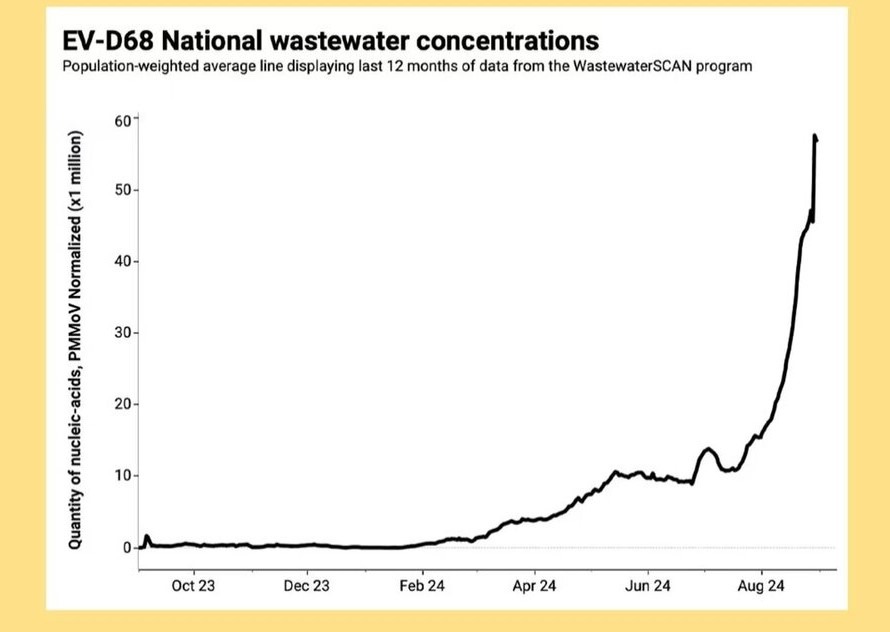As the new school year begins, concerns are growing over a rise in enterovirus D68 (EV-D68), a respiratory virus linked to acute flaccid myelitis (AFM) in children. There has been a concerning rise in the virus, which can result in severe paralysis, in recent wastewater tests. The timing, experts caution, may cause an increase in AFM cases because September usually has the greatest incidence. Parents should be vigilant for symptoms, including muscle weakness and facial drooping, and practice good hygiene to help protect their children. With no specific treatment for AFM, staying informed and proactive is crucial for safeguarding children’s health.
What is Enterovirus D68 (EV-D68)?
Enterovirus D68 is part of a larger group of enteroviruses, which are common and usually lead to mild respiratory illnesses. Symptoms often resemble those of the common cold, including:
- Runny nose
- Coughing
- Fatigue
- Body aches

However, in rare cases, EV-D68 can cause more severe symptoms, particularly affecting the nervous system. This includes muscle weakness, facial drooping, and even paralysis. The virus is primarily spread through respiratory secretions such as saliva and nasal mucus, and can also be contracted by touching contaminated surfaces.
Recent Findings Raise Alarm
Alexandria Boehm, a professor at Stanford University and director of WastewaterSCAN, has noted an alarming rise in EV-D68 detected in wastewater samples across the country. “We are detecting EV-D68 nucleic acids in wastewater, and the levels are increasing,” she said. This uptick serves as an early indicator of a potential surge in AFM cases, which is particularly concerning given that September has historically been the month with the highest incidence of AFM.

Caitlin Rivers, an epidemiologist at the Johns Hopkins Center for Health Security, echoes these concerns. “The time of year is right,” she stated, highlighting the possibility of a notable rise in AFM cases this year. In the past, significant outbreaks have occurred approximately every two years, with the first major spike happening in 2014, when 120 children were diagnosed with AFM.
The Impact of AFM
AFM is a rare but severe condition that primarily affects children. The neurological symptoms can lead to long-lasting disabilities, even after intensive physical therapy. Currently, there is no specific treatment or vaccine for AFM, which heightens the urgency for monitoring and prevention.
As of early September 2024, the Centers for Disease Control and Prevention (CDC) reported 13 confirmed AFM cases among 22 patients under investigation. In the previous year, there were 18 confirmed cases among 40 investigated patients, contributing to a total of 758 confirmed cases since the CDC began tracking AFM in 2014.
Symptoms to Watch For
While most cases of EV-D68 result in mild symptoms, it’s essential for parents to be vigilant. Mild symptoms include:
- Stuffy or runny nose
- Cough
- Fever
- Muscle pain
- Sore throat
However, parents should be particularly alert for severe symptoms, which may include:
- Sudden weakness in the arms or legs
- Slurred speech
- Difficulty swallowing
- Facial drooping
- Back, neck, or arm pain
If any of these severe symptoms appear, immediate medical attention is crucial.

Prevention Measures
Health professionals emphasize the need of preventative actions due to the possible severity of EV-D68 and AFM. The following advice can be used to help keep kids safe:
- Practice Good Hygiene: One of the best strategies to stop the transmission of viruses is to wash your hands often with soap and water. Kids should be encouraged to wash their hands often, especially after sneezing or coughing.
- Avoid Contact with Sick Individuals: If someone in the household is ill, take precautions to limit exposure.
- Stay Informed: Keep up with the latest health advisories and updates regarding EV-D68 and AFM in your area.
- Seek Medical Attention: If a child exhibits respiratory symptoms that worsen or show signs of severe illness, consult a healthcare provider promptly.
As the risk of EV-D68 and the associated polio-like illness rises, parents and caregivers must remain vigilant. Monitoring symptoms, practicing good hygiene, and staying informed can help mitigate the risks associated with this concerning virus. With the right precautions, we can work towards protecting our children and ensuring their health and safety during this potentially dangerous time.
Read More: Babesiosis: An Emerging Tick-Borne Issue in the U.S.






